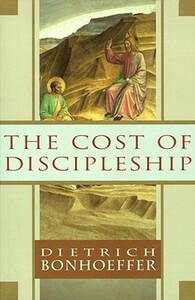Take a photo of a barcode or cover
challenging
inspiring
reflective
slow-paced
I don’t have sufficient words to review here…it requires a reread on my end to muddle through again and again to make sure I’ve taken note of all of Bonhoeffer’s avenues. The Sermon on the Mount sections of dissected scripture really hit for me. I’m still blown away (and grateful for!) how God has gifted certain saints with such depth of intellect about God and revelation of His Word. Give it a whirl.
challenging
hopeful
informative
inspiring
reflective
slow-paced
Bonhoeffer's The Cost of Discipleship is an important theological work that decries cheap grace. Said another way, Bonhoeffer offers a critique of the tendency to baptize the status quo as "Christian" because Christianity in the name of grace and in opposition to "works." Much of the work ends up being a lengthy excursus on Jesus' kingdom ethic as embodied in the Sermon on the Mount. Like Anti-Climacus' Practice in Christianity, Bonhoeffer does not shy away from the rigorous demanding character of Jesus' ethic. It is a call to live a different kind of life for the sake of others, and forsaking worldly comfort. It will involve suffering.
Yet the work is also situated in a cultural milieu where National Socialism was being baptized as "Christian" and Lutheranism's emphasis on grace was taken as a reason not to hold Christians in such a culture to Jesus' kingdom ethic.
One of the challenges with a work like Bonhoeffer's is that it's easy for sensitive believers to take the rigorous character of Jesus' kingdom ethic and direct it as oneself to such a degree that it is demoralizing and degrading. For someone in that situation, I think one probably needs to hear about God's unconditional love, his unfailing grace, and his acceptance of you as you are. That's not to say that Jesus' kingdom ethic doesn't apply to them. But the corrective they need may not be what they need to hear.
I do believe that in our present cultural moment in the United States that there is a tendency for white evangelical Christian, which has become largely a political/cultural category rather than a religious category, to find itself in precisely the same situation that made The Cost of Discipleship so poignant. That is, white evangelical Christians have difficulty separating Republican (i.e., Trumpian) politics/culture from their religious beliefs. This has happened to such a degree that key elements of scripture, for example, Jesus' kingdom ethic in the Sermon on the Mount, are decried as "woke" or "liberal." The least of the these are mocked, derided, and attacked rather than loved. The enemy is denigrated and despised rather than loved. Likewise, there is a rampant nationalism and confusion of support for the United States with support of Christianity. There is also tendency to pursue the acquisition of political/economic power over and against Jesus' kingdom ethic.
Of course, the American religious milieu is more diverse than 19th century Denmark or early-20th century German Lutheranism. The U.S. has no state religion, and religious diversity is certainly greater than in those social contexts. I do wonder whether those differences, however, make mainstream white evangelicalism more prone to being taken captive to nationalism, pursuing political/economic power rather than Christ's kingdom, politicizing one's faith, and making Christianity something without cost (cf., Trump can behave the way he does because he's a "baby Christian" rhetoric). Of course, there is a cost to being a "liberal" in white evangelical Christianity, if you are even considered a Christian at all.
Yet the work is also situated in a cultural milieu where National Socialism was being baptized as "Christian" and Lutheranism's emphasis on grace was taken as a reason not to hold Christians in such a culture to Jesus' kingdom ethic.
One of the challenges with a work like Bonhoeffer's is that it's easy for sensitive believers to take the rigorous character of Jesus' kingdom ethic and direct it as oneself to such a degree that it is demoralizing and degrading. For someone in that situation, I think one probably needs to hear about God's unconditional love, his unfailing grace, and his acceptance of you as you are. That's not to say that Jesus' kingdom ethic doesn't apply to them. But the corrective they need may not be what they need to hear.
I do believe that in our present cultural moment in the United States that there is a tendency for white evangelical Christian, which has become largely a political/cultural category rather than a religious category, to find itself in precisely the same situation that made The Cost of Discipleship so poignant. That is, white evangelical Christians have difficulty separating Republican (i.e., Trumpian) politics/culture from their religious beliefs. This has happened to such a degree that key elements of scripture, for example, Jesus' kingdom ethic in the Sermon on the Mount, are decried as "woke" or "liberal." The least of the these are mocked, derided, and attacked rather than loved. The enemy is denigrated and despised rather than loved. Likewise, there is a rampant nationalism and confusion of support for the United States with support of Christianity. There is also tendency to pursue the acquisition of political/economic power over and against Jesus' kingdom ethic.
Of course, the American religious milieu is more diverse than 19th century Denmark or early-20th century German Lutheranism. The U.S. has no state religion, and religious diversity is certainly greater than in those social contexts. I do wonder whether those differences, however, make mainstream white evangelicalism more prone to being taken captive to nationalism, pursuing political/economic power rather than Christ's kingdom, politicizing one's faith, and making Christianity something without cost (cf., Trump can behave the way he does because he's a "baby Christian" rhetoric). Of course, there is a cost to being a "liberal" in white evangelical Christianity, if you are even considered a Christian at all.
challenging
informative
reflective
slow-paced
If when we judged others, our real motive was to destroy evil, we should look for evil where it is certain to be found, and that is in our own hearts.
Uncomfortably reflective, as good theology should be.
A very heavy theological book. Bonhoeffer's writing is very intellectual and that often makes for difficult and dry reading. However, I enjoyed his last chapter on The Image of Christ.
challenging
reflective
medium-paced
El discipulado costoso, desde la perspectiva de un confesante
It is with great pleasure of mine that I can officially announce that I have finished this book after starting it way back in September.
informative




